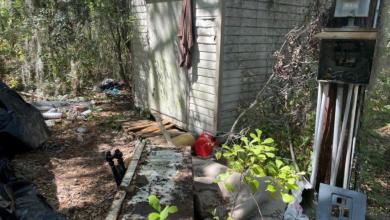‘First ever images’ of black bear cubs captured in this Bay Area park
The Brief
-
Wildlife cameras captured images of black bear cubs in a North Bay park.
-
It’s the first time cubs were seen on the cameras, park officials said.
-
The video offered evidence that bears are living and reproducing in the park.
SANTA ROSA, Calif. – For the first time ever, images of black bear cubs have been captured by wildlife cameras in a park in the North Bay.
The Sonoma County Regional Parks expressed excitement as the agency posted video of a pair of cubs trailing behind their mother at Hood Mountain Regional Park and Open Space Preserve located in Santa Rosa.
“We’ve been tracking bear activity at this park for more than 9 years, but this is the first time we’ve seen cubs on our wildlife cameras,” the agency said in its Feb. 19th post.
The images, captured at night, offered evidence that the bear population could be growing in the area.
Why you should care
“This shows that bears are not only travelling through the park, but also living and reproducing there,” the agency said.
Officials estimated that the cubs were about a year old and said that they had spent two winters in the care of the mother bear.
“Their first winter, they were born small and helpless in mom’s den. They spent that first year as C.O.Ys (cubs of the year) learning all about important food sources and safe places to travel. With that knowledge in place, they’ll be ready to strike out on their own,” the regional park agency said.
SEE ALSO: Puppy ingests 44 items including socks, onesie prompting emergency surgery
Park officials noted that the juvenile bears would likely be ready to venture on their own this spring or summer.
Officials said the discovery of the cubs at Hood Mountain Regional served as a good reminder that Sonoma County is bear country.
Bear sighting
On the regional park’s Facebook page, a resident recently posted about a frightening encounter with a black bear on the top of Sonoma Mountain behind Jack London State Park.
Mike Baskin said it happened on Feb. 28 at around 5:00 p.m. as he was mountain biking with a friend. He said he heard a loud roar and saw the bear about 200 feet away.
“Nerving to say the least,” he shared, as he sought instructions on how to report the sighting.
Tips on staying safe
Wildlife experts say that bear attacks are rare, but there are steps humans can take to keep themselves and bears safe.
In the event you encounter a bear, experts say you should never approach the animal and never run.
“Make yourself appear as large as possible. Stay calm and quiet, and slowly back away. If the bear approaches you, make noise and yell, Go, Bear, Go!” advised California State Parks experts.
If you have children with you, experts say you should pick them up.
Pet owners walking their dogs where bears may be present are urged to keep their dogs on a leash.
“Off-leash dogs may chase a bear and cause the bear to defend itself, and things can get serious when humans try to defend their pet or a dog runs back to its owner with a bear in pursuit,” Sonoma County park officials said on the agency’s website.
The agency said it’s taking measures to prevent conflicts with bears in the region.
“It’s key that these cubs (and their mom) don’t develop a taste for human food and trash,” park officials said, noting that they’re working to install bear-resistant trash cans and food lockers in park areas where bear activity is detected.
What you can do
They stressed that to co-exist with the animals, the public needs to seek ways to prevent bears from associating humans with the presence of food.
Those measures include being diligent in securing not only food but trash, beehives, and chicken coops on properties.
“Black bears love to eat and quickly become addicted to human food and garbage,” state park officials explained, adding, “Bears can become destructive and aggressive when this happens.”
Source link


